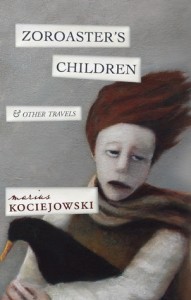 I’m always excited when I get a package from Canadian publisher Biblioasis. The books they publish (including Alphabet, The Tuner of Silences, and The End of the Story) are intelligent, creative, and well-written and Zoroaster’s Children by Marius Kociejowski is no exception.
I’m always excited when I get a package from Canadian publisher Biblioasis. The books they publish (including Alphabet, The Tuner of Silences, and The End of the Story) are intelligent, creative, and well-written and Zoroaster’s Children by Marius Kociejowski is no exception.
To call Kociejowski a travel writer is to do him a grave disservice. Although he writes about cities from Colombo to Toronto, he’s not writing about destinations and sites. He’s exploring these places and cultures through the lens of the individuals he meets. He’s delving into the very roots of what make creativity as he spends the day with a calligrapher in Aleppo. He’s not laying out the most scenic routes; he’s remembering the “people who guided [him] over and beneath surfaces” in Iran. He’s writing about culture and also about the moments and connections that make us human. The book is filled with short essays that made me want to sit… contemplate… digest… understand.
“I did what most people visiting for the first time do, so I will dispense with glowing descriptions of museums and churches.” – Marius Kociejowski, Zoroaster’s Children
The (In)Human
In “The Man on the Train from Galle,” Kociejowski exposes the geopolitics of Sri Lanka through his interaction with one man—a fellow passenger on the train who also happened to be a colonel. They speak (and we learn) of Sinhalese history and culture, of religion, and of war. In the end, the man unburdens the secret of one act he committed in the name of war. It’s a complex situation—one that’s posited as self defense but sounds more like a war crime. Kociejowski poses the man against Conrad’s Mr. Kurtz and then lets us sit with that story, the feeling of having met the man, and the amazing change of life and perspective that can happen in a mere three hours—a mere seven pages.
The Artist
“The Master Calligrapher of Aleppo” can only be read these days with the clamoring background of the war in Syria—a war that has decimated Aleppo along with millions of lives. How strange (and special) it is, then, to sit with Kociejowski as he sits with a calligrapher in a 13th. c. mosque as he writes and rewrites verses from the Koran using the ancient art of calligraphy. “‘You can spend months on a single letter,'” Kociejowski quotes the calligrapher, yet in a few short pages we travel through the history of calligraphy, the nature of art, and the relationship between man and God.
“The calligrapher’s work lies in search of the absolute; his aim is to penetrate the sense of truth in an infinite movement so as to go beyond the existing world and thus achieve union with God.” – Salah al-Ali, Islamic Calligraphy: Sacred and Secular Writings
“History is everywhere here,” Kociejowski writes of Aleppo, and I wondered if that’s indeed true anymore after the massive bombing that continues even now. But then he quotes an 11th c. poet saying, “Take care where you walk, because you walk upon the dead,” and I remember that history is not some textbook on my shelf. It is the layers of life and conflict, of rebuilding and destruction, that we create every day. This is the power of Kociejowski’s writing—to shake the reader out of the complacencies of our everyday lives even as he’s exploring the subtle details of one day in one life.
The Union between Writer and Reader
As good as Kociejowski’s writing is, some of my favorite moments reading this book were as I drifted in and out of consciousness as I napped with my baby in my lap. It wasn’t just the cozy maternal feeling I was enjoying. It was also this incredible series of moments where I was so tired I was mingling Kociejowski’s words with my own on the page. He had given me the gift of opening up my thinking brain and the space to express my writing self in this space between us. I can’t remember any of the words I inserted onto his pages, but I still carry the sense of having touched some divine creative force. The kind of force that can sustain me through a long drought of time for creation.
I could tell you of “The Saddest Book I’ll Never Write” where Kociejowski introduces friend after friend he met in Syria while wondering if any of them still survive. I could also tell you about “‘Moonlight and Vodka'” which is as much about poetry as it is Russia. Or I could tell you about the title essay where we learn about the layers of religion in Iran while conversing with a bookseller who loves most the works of Virginia Woolf.
What I want to tell you, though, is the highest praise I can conjure: This book is open to the world. Open to experience. And Kociejowski is a flaneur of prose. I would follow him on his wanderings anywhere and can’t wait to read another of his books.
To travel with Kociejowski, pick up a copy of Zoroaster’s Children from Bookshop.org. Your purchase keeps indie booksellers in business and I receive a commission.





Leave a Reply